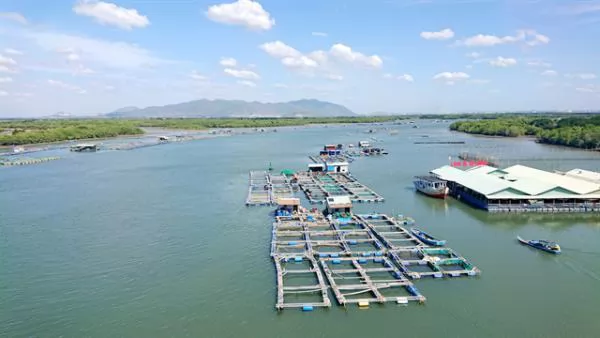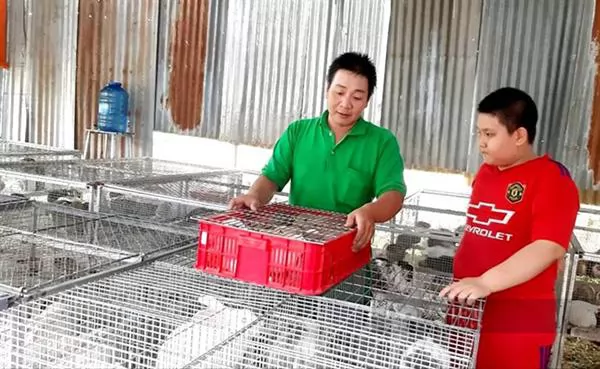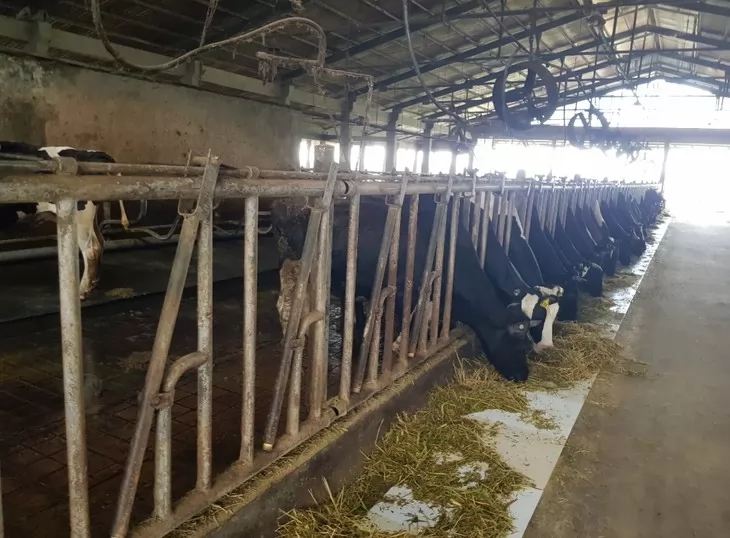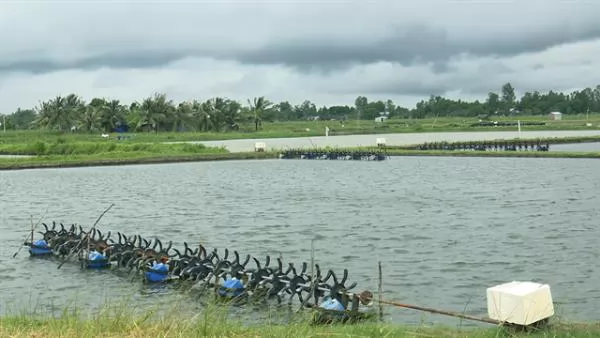Bà Rịa - Vũng Tàu protects marine resources, develops aquaculture

Floating cage aquaculture in the Chà Và River in Vũng Tàu City's Long Sơn Commune. - VNA/VNS Photo Hoàng Nhị
BÀ RỊA – VŨNG TÀU – The southern province of Bà Rịa – Vũng Tàu is protecting seafood resources and developing aquaculture sustainably, with local authorities preventing destructive fishing activities and encouraging farmers to apply advanced techniques.
The province, the fishing hub of the south-east, faced difficulties such as declining catches in recent years because of depleting resources caused by destructive fishing activities like trawling and gillnetting.
To mitigate the destructive activities, the People’s Committee has tasked the Department of Agriculture and Rural Development with helping fishermen working on near-shore fishing boats and trawling and gillnetting vessels to switch to other jobs.
It has refused licences for trawlers since 2013, and enabled fishermen on such boats to switch to other jobs.
The number of trawlers has reduced by 62 in the first half of this year to 1,476.
Lê Văn Tòng, head of the Fisheries Sub-department, said the catch in the first half of the year is estimated at 185,200 tonnes, an increase of 1 per cent year-on-year.
The focus now is on high-value species like tuna, mackerel, cuttlefish, and octopus, he said.
In the first half of the year the province harvested 9,600 tonnes from aquaculture farms, 427 tonnes higher than in the same period last year. The increase was mostly in white-legged shrimp output.
With about 6,300ha of aquaculture farms, the province has implemented various development policies in recent years, including encouraging farmers to use new technologies.
The use of advanced techniques extends to around 5.6 per cent of the total area.
There are more than 400ha of shrimp farms that use advanced techniques and super- intensive farming methods. The model has a success rate of 90 per cent and fetches an income of VNĐ1.2 – 1.4 billion (US$52,000 – 61,000) per hectare per crop, many times higher than from traditional methods.
Now more farmers, co-operatives and companies use advanced techniques.
Bùi Thế Vương has a 7ha shrimp farm in Long Điền District’s An Ngãi Commune where he uses super - intensive farming techniques. He uses 1.5ha to farm the crustaceans and the rest to filter and treat the wastewater generated.
He can harvest three to five shrimp crops a year, at least twice the number possible using traditional methods, he said.
The death rate of shrimp is also lower, he said.
The province has 500 breeders using floating cage aquaculture methods, mostly in Vũng Tàu City and Phú Mỹ Town, who harvest round 15,000 tonnes of produce a year.
More and more farmers use advanced techniques such as automatic feeding and environment monitoring systems.
They also use high-density polyethylene (HDPE) floating cages and nets with anti-fouling coatings based on Norwegian technology.
The cages, which are either round or square, can endure winds and waves, and contain a large volume of fish as they have a perimeter of up to 100 metres and a depth of up to six metres.
Phan Hoàng Sơn in Vũng Tàu City’s Long Sơn Commune said he has been using HDPE floating cages to breed marine fish for three years.
“[They] can be in the sea far from shore and with clean water, which prevents pollution and disease. Their efficiency is 20 per cent higher than traditional cages.”
Nguyễn Hữu Thi, head of the province Fisheries Sub-department’s Cultivation Division, said aquaculture would be developed by applying advanced techniques, with priority given to shrimp breeding and floating cages.
The floating cage aquaculture is especially encouraged in estuaries and islands since they are suitable for breeding high-value species like cobia, grouper, promfet, lobster, pearl oyster, and ornamental creatures.
The People’s Committee encourages setting up centres for research and farms for producing seeds for commercial farming.
It has created favourable conditions for farmers to breed a range of species, use diverse breeding methods and apply good agricultural practices (GAP) standards and origin traceability, especially for products like black tiger shrimp and white-legged shrimp.
It has solicited investment in seafood processing to meet both domestic and export demand. – VNS
Maybe you are interested

Hopping on the trend: Tiền Giang farmer finds fortune in rabbits
TIỀN GIANG — Đặng Hồng Phúc was one of the first large-scale rabbit breeders in Chợ Gạo District, in the Mekong Delta province of Tiền Giang, turning to them after failing to make ends meet in raising other livestock.

Tan Tai Loc dairy farm - a role model in Soc Trang
Tan Tai Loc dairy farm in Dai Tam commune, My Xuyen district, Soc Trang province, meets international standards, thanks to applying modern technology in raising dairy cows. It is a role model in rural economic development in Soc Trang.

Sóc Trăng develops effective shrimp farming models
SÓC TRĂNG — Farmers in the Cửu Long (Mekong) Delta province of Sóc Trăng have begun breeding shrimp, and hope for a yield of 196,000 tonnes this year, according to the local Fisheries Sub-department.





